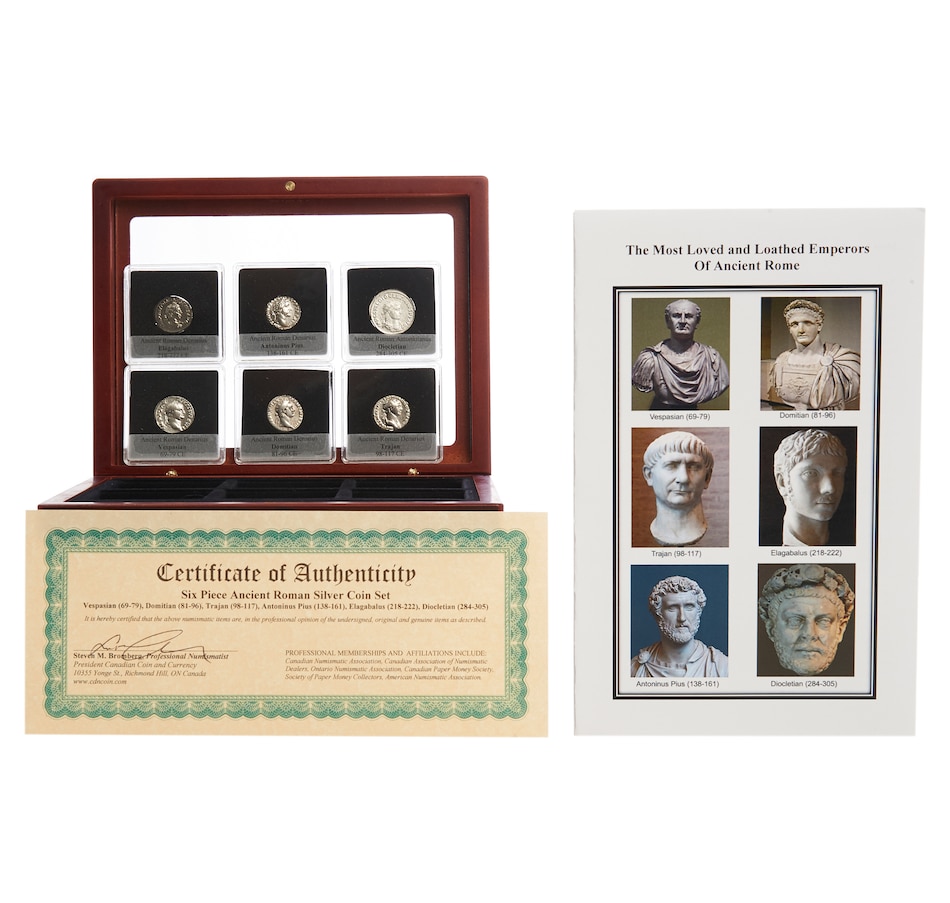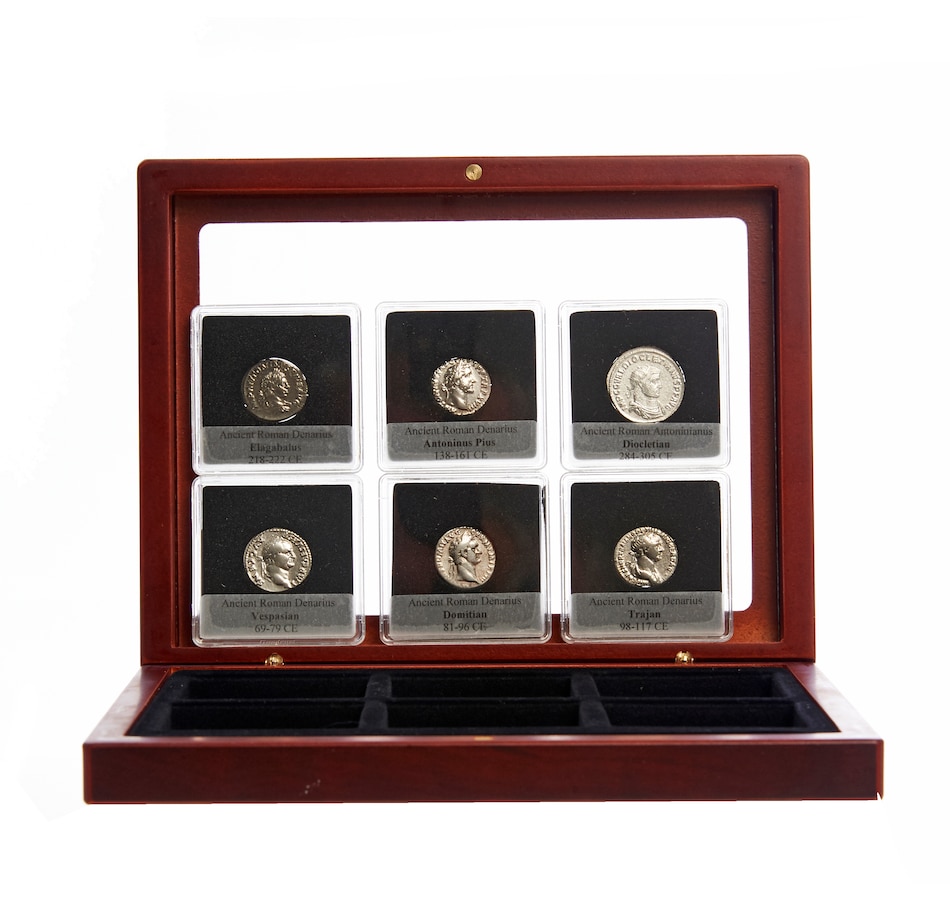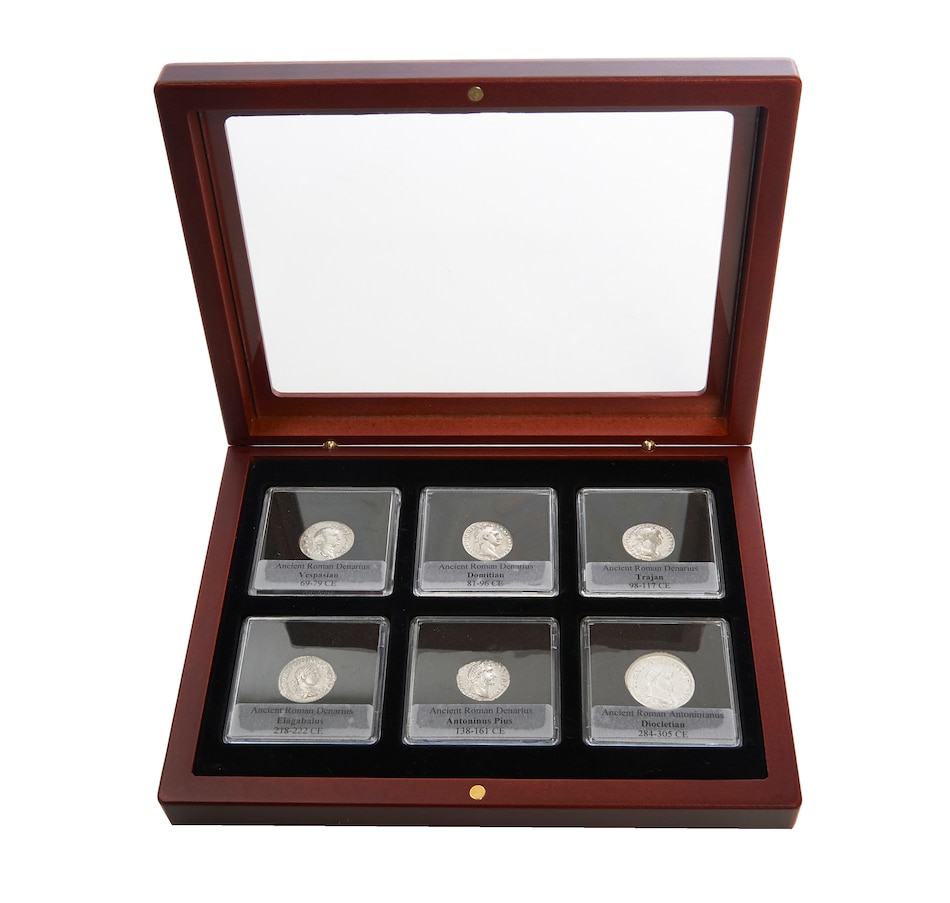Six-Piece Ancient Roman Silver Coin Set - Three Most Loved and Three Most Loathed Roman Emperors, 69 CE to 305 CE
Free Shipping
Product Overview
Coins from the emperors Vespasian, Trajan and Antoninus Pius are presented as three of the most loved emperors in the history of the Roman Empire, contributing significantly to the growth, development and culture of ancient Rome. Coins from Elagabalus, Domitian and Diocletian are presented as some of the most hated or loathed emperors. These rulers tyrannized Rome through extreme abuses of power, cruelty, depravity and even insanity.
Every coin in the collection is in very good to excellent condition and is guaranteed as a genuine and original antiquity. The coins are presented in a display cases together with a certificate of authenticity and information about each emperor and his reign.
Most Loved:
Vespasian (69–79), Builder of the Colloseum – Denarius Coin:
He was senator and consul by 51, ended the turmoil caused by the deaths of Galba, Otho and Vitellius in 69 (the disastrous "year of the four emperors"). He was also a successful military commander who gained honours in the Roman invasion of Britain in 43, and quelling the Jewish rebellion in 66. Upon taking office he reformed the financial system and built the Colosseum where the 900th anniversary of Rome was celebrated lavishly, with galleys battling on water, millions of exotic animals sacrificed, and 500,000 Romans viewing. Upon his death in 79, Vespasian was deified by the senate.
Trajan (98–117), Military Commander and Builder – Denarius Coin:
He was Nerva's adopted son who reshaped Rome, building many landmarks including Trajan's Column, the Forum and Market, besides many triumphal arches and roads (e.g., Via Traiana). He augmented Rome's first welfare and education system for poor children, the alimenta, funded from loot from campaigns. His success as a military commander expanded the Roman empire to its furthest extent, adding new provinces to it, including Dacia, Armenia, Mesopotamia, Arabia (Nabatea) and Parthia. After 19 years of stable government, Trajan died of a stroke in 117 and was deified by the senate.
Antoninus Pius (138–161), Benevolent Governor of the Empire – Denarius Coin:
Antoninus Pius was Hadrian's chosen successor, and an unprecedented peaceful and prosperous rule of 23 years followed his accession. He was the first emperor to rule the empire without leaving Rome, leaving dealing with local troubles to the governors of the region. He was said to have "donated his private wealth to assist distressed provinces, and turned conspiracies into opportunities to demonstrate clemency.
Most Loathed:
Elagabalus (218–222), Deviant Emperor – Denarius Coin:
As a boy of 14, Elagabalus was appointed a priest of the sun-god Elagabalus before being proclaimed emperor by rebelling troops in Syria in 218, who executed then-emperor Macrinus on his orders. Elagabalus was an effeminate religious fanatic who disregarded sexual taboos; was reputed to have prostituted himself as a transvestite in the imperial palace; had a homosexual affair with Hierocles, a charioteer; and outraged the public by marrying a "vestal virgin" amongst his five wives. His reign was famed for depravity, cruelty, bloodshed and excess. Elagabalus and his mother were murdered in 222. Their bodies were dragged through the streets of Rome and dumped into the Tiber river.
Domitian (81–96), Tyrant – Denarius Coin:
Domitian was the youngest son of Vespasian, and he became emperor upon the death of Titus. A revolt in Germany failed before he reached it, but he immediately claimed success and executed the leaders including 11 senators of consular rank, and exiled many others. This enraged the senate, but Domitian had successfully demonstrated how he would deal with senators who challenged him. Domitian was an unusual emperor, and even wrote and published a book on baldness and its cures. Towards the later years of his reign, he became an increasingly oppressive and violent tyrant. As the result of a palace plot involving his wife Domitia and the praetorian prefect, he was murdered on September 18, 96.
Diocletian (284–305), Persecuted Christians – Antoninianus Coin:
He was ruthless in the persecution of Christians as he set about to eradicate the religion. Churches were destroyed, scriptures burnt and Christian priests imprisoned and forced to conduct sacrifices to the emperor on pain of death. It was an unusually vicious persecution and it reflects Diocletian's fear that, at a time when unity of purpose was essential for the empire's survival, Christianity represented a rejection of Roman religious values that he could not afford to allow.
Includes:
• Six-Piece Ancient Roman Silver Coin Set: Most Loved and Most Loathed Roman Emperors







